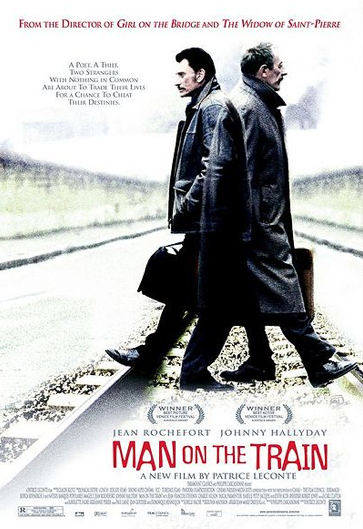

Director: Patrice Leconte, 2002.
Chance encounters often lead to the strangest relationships. Strangers can be honest with one another, not wearing the masks in place to protect our real selves. A chance encounter is at the start and at the heart of this award-winning French movie.
A man gets off a train at small village station with a deep headache. At the pharmacy he buys aspirin and meets an older man. Needing water he accompanies this man to his nearby home then leaves to go claim a room at the village hotel. Alas, it is closed! No room in the inn for him, so he resorts to returning to the old man's home to spend the night . . . and a few more.
Milan (Johnny Hallyday), the middle-aged man on the train, has come to town to rob the bank. He is going to meet up with his band of criminals later in the week, but initially meets Monsieur Manesquier (Jean Rochefort), a retired poetry teacher. These are two men as different in personality as they are in age. But surprisingly a friendship of sorts begins to develop.
 As with many French films, the pace is slow enough to allow characters to emerge. As they do, we begin to understand these two men. As opposite as they are, they have one thing in common: they are not satisfied with their lot in life.
As with many French films, the pace is slow enough to allow characters to emerge. As they do, we begin to understand these two men. As opposite as they are, they have one thing in common: they are not satisfied with their lot in life.M. Manesquier is old and lonely. When Milan enters his life, he has a person to talk to; though Milan is the dark and silent type, the brooding gangster. He will not open up easily or quickly. But when he joins his gangster friends he begins to see that life as unfulfilling. He needs the money but wants something different. He wants to read books about poetry.
 Back at M. Manesquier's home, Milan sees two toothbrushes in the bathroom. He asks, "Why two combs and two toothbrushes?" Manesquier replies, "There are two kinds of men. Those who say, 'I must buy a toothbrush; I've lost mine," they're adventurers. And those who have an extra tooth brush. . . . Planners, at best." Here is the central contrast of the film: planners and adventurers. Manesquier had been a planner his whole life, surrounded by a library filled with books, reading his poetry, teaching his students. His life was uneventful. Even when he tries to pick a fight, he fails. Milan, on the other hand, is no planner; he has adventure to spare robbing banks. But both are bored with their lives and want what the other one has. Excitement for equanimity. As the climax arrives we wonder if they got what they wanted.
Back at M. Manesquier's home, Milan sees two toothbrushes in the bathroom. He asks, "Why two combs and two toothbrushes?" Manesquier replies, "There are two kinds of men. Those who say, 'I must buy a toothbrush; I've lost mine," they're adventurers. And those who have an extra tooth brush. . . . Planners, at best." Here is the central contrast of the film: planners and adventurers. Manesquier had been a planner his whole life, surrounded by a library filled with books, reading his poetry, teaching his students. His life was uneventful. Even when he tries to pick a fight, he fails. Milan, on the other hand, is no planner; he has adventure to spare robbing banks. But both are bored with their lives and want what the other one has. Excitement for equanimity. As the climax arrives we wonder if they got what they wanted.Is it wrong to want another person's life? Certainly, the Ten Commandments warn us against covetousness (Ex. 20:17). But that is coveting things: a house, a wife, belongings. Here the idea is more life and lifestyle. Realizing what is missing in one's life is not wrong. But what we do about it might be. If we are stuck in a career rut, as Milan seems to be, putting a finger on what we really want can be a tremendous god-send. As Milan recognizes finally what he wants, he can look in hope to a day when he might adopt this career or lifestyle. Likewise, if we see a friend doing something we want to do, it might be a divine message pointing us in a different direction.
What of planners versus adventurers? Is one better than the other? There is certainly something to be said for planning. Jesus pointed out the value of counting the cost before undertaking a venture (Lk. 14:28-33). As a planner myself, I can understand the usefulness of making preparations and taking precautions.
But the Bible also says that plans do not always work out the way we expect (Jas. 4:13-14). Too much planning may leave us lifeless and ill-prepared to experience life's true adventures. The apostle Peter was a reckless and rash adventurer. Never thinking too much before speaking his mind (Jn. 13:6-7) or swinging a sword (Jn. 18:10), he was ready to jump right in.
Balance is the key. We are all created with a tendency to one end of the planner-adventurer spectrum. But being able to flex and experience both facets will allow us to be more rounded. Planning and adventuring can be joined together if we take care to not let one become too extreme. Plan for it!
Copyright ©2009, Martin Baggs

No comments:
Post a Comment